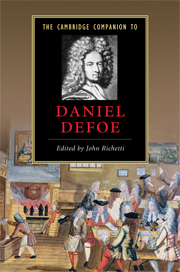Book contents
- Frontmatter
- Introduction
- 1 Defoe: the man in the works
- 2 Defoe’s political and religious journalism
- 3 Defoe, commerce, and empire
- 4 Defoe and criminal fiction
- 5 Money and character in Defoe’s fiction
- 6 Defoe’s Tour and the identity of Britain
- 7 Defoe as narrative innovator
- 8 Gender and fiction in Moll Flanders and Roxana
- 9 Defoe and London
- 10 Robinson Crusoe: varieties of fictional experience
- 11 Defoe: satirist and moralist
- 12 Defoe and poetic tradition
- Further Reading
- Index
11 - Defoe: satirist and moralist
Published online by Cambridge University Press: 28 March 2009
- Frontmatter
- Introduction
- 1 Defoe: the man in the works
- 2 Defoe’s political and religious journalism
- 3 Defoe, commerce, and empire
- 4 Defoe and criminal fiction
- 5 Money and character in Defoe’s fiction
- 6 Defoe’s Tour and the identity of Britain
- 7 Defoe as narrative innovator
- 8 Gender and fiction in Moll Flanders and Roxana
- 9 Defoe and London
- 10 Robinson Crusoe: varieties of fictional experience
- 11 Defoe: satirist and moralist
- 12 Defoe and poetic tradition
- Further Reading
- Index
Summary
It could be argued that more or less everything Defoe wrote involved some moral evaluation of human behavior and that this evaluation was generally ironic. But this does not mean that his writing is all of a piece. At first the opposite seems true, as different works written in different contexts produce a few contradictions in his examination of character and conduct. But a recognisable moral outlook still emerges, in which Defoe's stern ethical code jostles with a generally sympathetic interest in human beings under pressure. To discuss the subject we must interpret “satirical” in a broad sense which includes much of Defoe's later journalism, novels, and etiquette manuals as well as the verse satires proper which preceded them. Defoe names as “Satyrs” seven early poems: A New Discovery of an Old Intreague (1691), The True-Born Englishman (1701), The Mock Mourners (1702), Reformation of Manners (1702), More Reformation (1703), The Dyet of Poland (1705), and Jure Divino (1706). Their dates remind us that verse satire occupied him intensively for several years after he began writing, but in 1708 he drew a line under serious poetic composition by declining to compose a poetic tribute to Prince George of Denmark, who had died recently. In his periodical The Review Defoe explained to an imaginary questioner that his “Rhiming Days” were “almost done” and that he no longer thought himself “quallify'd for such a Subject.” Instead he had already begun concentrating on less aggressive satire in prose.
- Type
- Chapter
- Information
- The Cambridge Companion to Daniel Defoe , pp. 200 - 215Publisher: Cambridge University PressPrint publication year: 2009
- 2
- Cited by

